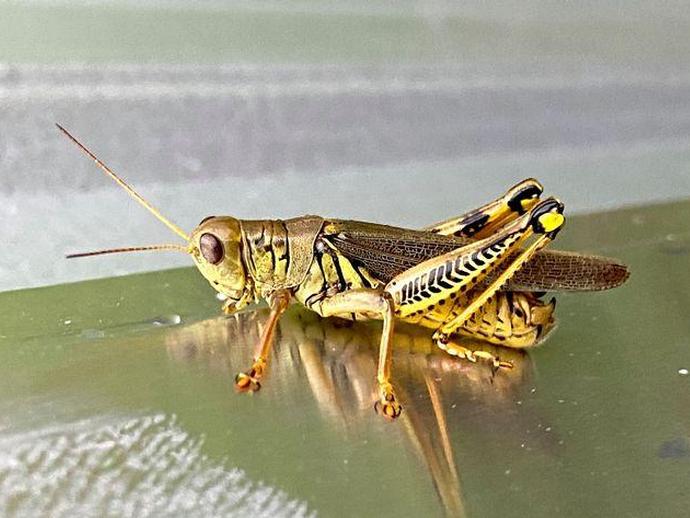September 24, 2021
Ben here with today's edition of #BenInNature presented by our friends at Carter Bank & Trust!
This is the differential grasshopper (Melanoplus differentialis), and I was a bit surprised to find it in Patrick County the other day. While this species occurs throughout most of the U.S. and Mexico, the range maps I've seen show that it's not generally found along the southeast coast, and Patrick County is probably close to the eastern extent of its range in Virginia!
The fact that this grasshopper doesn't extend too far east is good news for Virginia farmers because this species can be a serious pest. These grasshoppers prefer to eat "forbs," which is a term for herbaceous flowering plants that are not grasses. However, it also loves to eat grains, corn, alfalfa, soybeans, cotton, numerous vegetables, and even fruit trees. A swarm of these grasshoppers can destroy a young cornfield in just a few days!
These grasshoppers are not truly migratory, but over the course of a summer, they can travel 20 miles or more seeking food. The eggs hatch in late spring and the grasshoppers develop into adults in about a month, especially if the weather is warm.
Interestingly, humans have had a massive impact on the abundance of this species. These grasshoppers were originally restricted to wet meadows and creeklands, which were the best places to find the tall herbaceous plants they like to eat. Human development, however, introduced weedy areas at roadsides and crop borders, which provided the perfect conditions for the differential grasshopper to proliferate!
ABOUT #BenInNature
Social distancing can be difficult, but it presents a great opportunity to become reacquainted with nature. In this series of posts, Administrator of Science Ben Williams ventures outdoors to record a snapshot of the unique sights that can be found in the natural world. New updates are posted Monday - Friday, with previous posts highlighted on the weekends. This series of posts is made possible thanks to the support of VMNH Corporate Partner Carter Bank & Trust (www.cbtcares.com).
NATURE PHOTO IDENTIFICATIONS
If you discover something in nature that you would like help identifying, be sure to message us right here on Facebook with a picture (please include location and date of picture) and we'll have our experts help you identify it!

 Hours & Admissions
Hours & Admissions Directions
Directions

